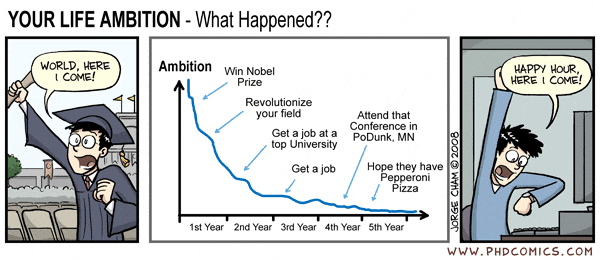Grad school is sure to be a challenge to your skills, discipline, education, and time. While you probably acknowledged these aspects of grad student life before you signed the dotted line, how can you make sure you make the most of your time in grad school? Below is a collection of goals to pursue during grad school, contributed by several different grad students, in no particular order. Some of these goals have undoubtedly developed from some of the valuable (and more or less painful) lessons learned in grad school.
- Set a goal to go to sleep by a certain time and– probably harder– wake up at a certain time. Before COVID-19, I would always set my goal to sleep by 11pm and wake up at 7am. The weeks I achieved these daily goals, I was much more productive and upbeat.
- Whatever your personal best-working-hours are, try to maintain a healthy sleep schedule. While the specifics will vary for each individual, we all need regular rest. Grad school is a marathon, not a sprint!
- Try to be strict about the hours you work (or don’t work) during the week (e.g., working 9am – 5pm, Monday-Friday).
- Take time for health, both mental and physical. Allow yourself at least some time each day for brief exercise. Anywhere from 15-30 minutes will improve your mood exceptionally.
- Group activities can be great too, whether taking part in a formal/informal sport team/event or a directly an “exercise” group. Look for groups organized not only within your university at large, but also within “The Grad School” and even your own department.
- Set a goal for yourself to attend more scientific conferences in your field, especially now that most are going virtual (due to COVID-19). This is a great way to improve your research and meet other future colleagues in your field.
- Attend at least 1 in-field [conference] every year. Ideally, more than 1. You don’t need to be a presenter every time, but you still need to go! It helps you measure yourself against your peers, shows you active research areas/problems, lets you meet peers in your field (could be your future friends/jobs), socialize with other humans, and always re-energizes you to do more research once you get home! And you can’t assume that your advisor will send you on these conferences. You should be active in seeking them out yourself.
- Conferences are also a primary way to witness and practice academic public speaking.
- Use a calendar/daily planner to make a checklist of research tasks/items that you can physically mark off after you complete them. Completing the “easy” tasks first helps me.
- Set strict deadlines for important tasks (i.e., manuscript submission), otherwise you may keep coming up with excuses to push back your work further and further into the future.
- Talk with your advisor early and often about what your dissertation chapters will be. The more structure you have early on, the better.
- Sometimes you may have a goal that you have to reassess– for example, I spent about a year trying to upgrade my experimental apparatus. The upgrade I wanted to implement didn’t end up working and would have significantly delayed my graduation timeline if I had kept working on it. I had to step back from that and figure out other ways to improve my setup.
- Learn how to read independently. That is, practice reading and understanding on your own, such that you can solve problems more (not totally) independently. Learn how to read instruction manuals! Helpful manuals are often available, even though they may not be complete/exhaustive/perfect. But any mature researcher must be able to extract useful value from these.
- A typical flow for me to understand new material is something like: Google → Wikipedia → advisor → textbook → literature → Google → advisor.
- Learn what you want and how to ask for it. You will be stunted until you can precisely and accurately phrase your questions in a way that uses the appropriate lingo, and is amenable to receiving helpful information. Relates to human/diplomatic/civil relations, using appropriate science terminology, simplifying the questions you seek answers to, etc.
- Learn how to set and achieve goals. For me, these have ranged from cooking bigger meals that save me from spending extra time cooking during the week, to reasonable timelines for progressing research.
- Learn a computer language. Python is a popular all-around effective computer language to learn. Proficiency in the bash language is a “must” for being effective any time Linux (or Apple) computers are involved.
